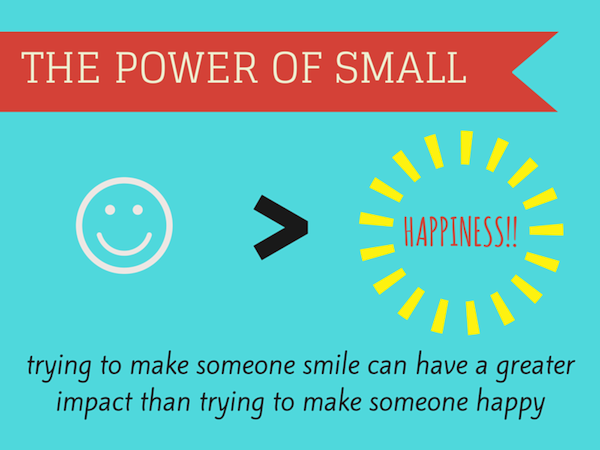Go big or go home. Shoot for the stars. Aim high.
Humans love to celebrate starting and finishing big goals but rarely take the time to savor the steps they took to get there.
These grand statements could actually be holding you back because they distract you from all your small wins/ small victories.
In the internet age, accomplishments seem larger than life because people rarely document the processes that got them to the finish line. We think small actions lead to small consequences, and grand motions have the most impact. But that’s not true.
We presume this “consequence-cause matching” because it helps the world seem more predictable and manageable. In return for believing this myth, we’re less happy and successful.
Doing one push-up a day, and writing one line a day might seem easy and unambitious. But that’s how you build a practice and, ultimately, achieve a big goal. Celebrating small wins might seem silly, but each one is a step toward reaching big dreams.
Why are small wins important?

Any measurable, incremental progress that aligns with the goals you’ve set is a “small win.” As author John C. Maxwell said, “Small disciplines repeated with consistency every day lead to great achievements gained slowly over time.”
For example, if you set a goal of writing a book, a small win could be finishing a chapter or getting positive feedback from your editor. Celebrating small wins impacts the way we view our achievements.
This concept can be linked to the Compound Effect, which Darren Hardy writes about in his book of the same name. It highlights the importance of a series of small, smart choices and how completing them consistently over time will result in radical changes.
Small wins can make all the difference in the long run If you just stick with it. You’ll surely remember all the small wins in your life later. Many research participants reported represented small wins are a big part of life.
Small wins help you measure growth

Small wins help us track all the incremental steps involved in achieving much larger goals. Even slow growth will help you in the long run.
A person who has smoked for over 10 years can decide to quit, but the actual process of quitting might not be as straightforward. Every time they turn down a cigarette or resist the urge to buy a pack at the grocery store, that signifies growth and a small step toward their larger goal.
Regardless of the type of goal you set, it’ll take time to achieve it. If you wait till you’ve reached the end to celebrate your accomplishments, your day-to-day progress may be impacted because you don’t recognize the improvements you’re making.
Small wins boost your confidence

We all want to shoot for the brass ring, but large abstract goals are associated with “greater psychological distress, such as anxiety and depression,” as this study found. On the other hand, smaller concrete goals have been linked to increased happiness levels.
In a study performed by Stanford researchers, 207 employees of a crowdsourcing company were assigned a task to track their work. The study found that those who set sub-goals and then switched to the overall goal were more productive than those who focused on only sub-goals or only overall goals.
The power of small wins is that they allow you to focus not on figuring out the what of your next actionable step but zoom straight to the how. And because the smaller goal is attainable and deliverable, you gain feedback faster.
As you stack your small wins, you’ll also create a constant source of motivation and inevitably build confidence.
Small wins is really great for personal and professional growth. Small wins, guided by the progress principle, illuminate the path to continuous improvement.
Small Wins Create More Motivation

Speaking of motivation, the way you perceive a goal can make or break your outcome. By changing the way you think about small wins, you can also work happier. And that’s crucial for your motivation.
Balancing work-life tremendously will surely improve your overall well-being.
As professor Teresa Amabile and psychologist Steven Kramer discovered in a research study outlined in their book The Progress Principle, making meaningful progress is the best motivator. And vital to this principle is recognizing that your Progress Principle counts as progress.
The researchers found that people consistently underestimated the significance of small events in their workdays. They would match the size of the consequence to the size of the cause — small to small, large to large — even though more than “28 percent of the small events triggered big reactions.”
The majority of events and reactions recorded in the journals were small events, which meant that people missed out on the power of small wins all the time. We’re often unable to gauge the significance of what happens without reflection and review to connect the dots.
Your progress is largely made up of small wins, and your happiness is made of small, cumulative bursts.
3 tips for recognizing and celebrating small wins
Learning to acknowledge your small wins takes practice. How can you consciously recognize and celebrate small wins?
1. Find a way to stay accountable

Don’t keep your goals, big or small, to yourself.
Find someone to report to, or The Progress Principle to keep you accountable. You can share your goals with a friend or spouse or even broadcast your goals on social media.
Other people can provide support and encouragement, as well as motivation. You are more likely to keep working toward your goals knowing that someone else is cheering you on to complete a task.
For example, if your goal is to get promoted at work, you can share that and the accompanying micro-goals with your manager or your team. That way, every time you hit a milestone, your goal is public enough that you don’t want to falter, and they are there to encourage you to keep going.
It would be nice to have a coach or accountability partner to monitor your tasks.
2. Set achievable micro-goals

When determining what counts as small wins, consciously note what exactly you need to do to achieve your major goal. Then, break it down into daily or weekly micro-goals that signify progress. This way, you understand what gets you to your finish line and can recognize your accomplishments.
In order to do this, you have to understand your overall goal and what constitutes a sign of making progress toward it. For example, if your ultimate goal is to buy a new house, micro-goals can be a weekly or monthly savings target.
This way, every time you save money, you know that you’re getting one step closer to achieving your goal.
If you see someone succeed with micro-goals, you should always appreciate his or her efforts for motivation purposes.
3. Create a rewards system

Rather than just acknowledging your small wins, find a way to reward yourself every time you hit a micro-goal.
You could try getting your favorite pastry from your local coffee shop or booking a massage every time you encounter a small win. It doesn’t have to be anything super elaborate, but it should be significant and rare enough that you look forward to the reward each time.
4. Keep Track of Your Progress

Keeping track of your progress in your small wins leads you to succeed in bigger wins.
According to a study from Harvard Business School, Small wins are extremely important and the study has this to say:
“Of all the things that can boost emotions, motivation, and perceptions during a workday, the single most important is making progress in meaningful work. And the more frequently people experience that sense of progress, the more likely they are to be creatively productive in the long run. … everyday progress—even a small win—can make all the difference in how [people] feel and perform.”
Build momentum until you’ve achieved your goal
Lowering your expectations sounds like you’re settling for the road to mediocrity and loserdom, but that disregards the scientifically proven cumulative effect of progress and the power of small wins. You can dream as big as you want, but the most sustainable, feedback-rich way to achieve greatness is to keep things small.

However, as you get closer to completing your big goal, build momentum and push harder. To avoid coasting and becoming distracted from your main goal, you need to keep the big picture in mind at all times.
This can be as simple as keeping your overall goal in a physical or digital space that you can see and access constantly. Try increasing the scope of your micro-goals as you gain more confidence and get closer to completion.
Our daily routines are part of a canvas that makes up a bigger picture. Always take the time to reflect upon your goals and visualize the finish line rather than just living every day with no direction.

